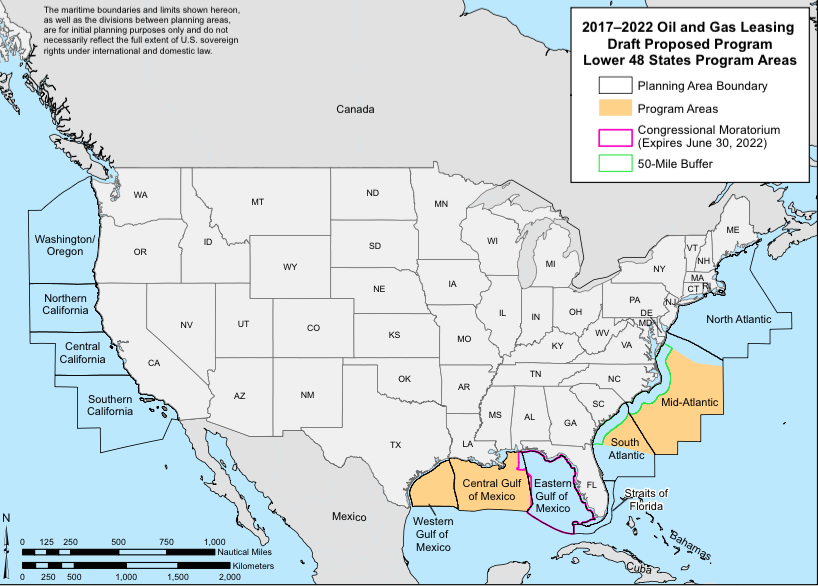The federal government took its first official steps toward opening the Atlantic Coast to drilling for offshore oil and gas reserves with the Jan. 27 release of a draft leasing plan.
The draft plan, effective from 2017 to 2022, released by the Bureau of Ocean Energy Management enables oil and gas companies to drill in the waters 50 miles off the coast of Virginia, North Carolina, South Carolina and Georgia. The plan proposes a lease sale for the Mid-Atlantic area late in the program, in 2021, “reflecting the need for additional analysis and planning to identify the infrastructure and resources necessary to prepare for development activity, particularly spill response capabilities.”
Opening the Atlantic Ocean to offshore drilling could change the visual and economic landscape currently enjoyed by coastal communities, said Oceana vice president Jacqueline Savitz.
“It could lead to a coastline scattered with oil and gas rigs. Commercial fishing, tourism and recreation economies would suffer from routine oil leaks as well as the looming risk of a Deepwater Horizon-like oil disaster stretching along the East Coast,” Savitz said in a Jan. 27 press release. “It’s not something people on the coast want to experience.”
A native of the Mississippi Gulf Coast, Environment North Carolina Field Associate Liz Kazal said she is disappointed to see North Carolina vulnerable to the potential consequences of drilling.
“As someone who experienced the BP Oil Spill firsthand, I’ve seen the damages that offshore drilling can bring to the coast from tar balls washing up onto beaches to pelicans and dolphins covered in oil,” Kazal said in a Jan. 27 press release. “The prudent action to take is to keep North Carolina out of the plan for good.”
The industry has learned many lessons since the 2010 Deepwater Horizon oil spill, when a Gulf rig exploded and gushed millions of barrels of oil into the ocean for more than 12 weeks, said American Petroleum Institute Director of Upstream and Industry Operations Erik Milito during a Jan. 27 press conference. Prevention is 99 percent of the approach, Milito said, but the industry has also worked to ensure quick access to technology needed to cap and contain spills within one week.
Savitz questioned whether drilling operations are safer now than in 2010.
“Despite the growth of the oil and gas industry, offshore drilling is still no safer than it was five years ago when the Gulf Spill captivated Americans for months as we awaited an end to the gushing oil,” Savitz said, citing no congressional action to implement standards preventing a similar event from taking place.
The release of the draft plan initiates a 60-day public comment period. Public comments will be used to shape and refine the first draft into a second draft and a final draft of the five-year program.
Environment North Carolina will work to provide a voice for individuals concerned about the inclusion of the Atlantic in the draft program, Kazal said.
“We’re going to be doing everything we can to get the public involved,” Kazal said.
A Harris Poll conducted on behalf of the American Petroleum Institute suggests seven in 10 North Carolina voters who participated in the poll support offshore oil and gas exploration, said North Carolina Petroleum Council Executive Director David McGowan.
“Voters in North Carolina know developing more of America’s homegrown energy makes sense for jobs, government revenues, and our energy security. We could bring more than tends of thousands of good-paying jobs to North Carolina and diversify our economy simply by allowing more oil and natural gas production to occur in our state and off our shores,” McGowan said in a Jan. 27 press release.
Because the public will have ample opportunity to provide input used to tweak the draft program, Milito called for “full consideration of all planning areas where significant discoveries are possible” in the plan in support of an ongoing American energy renaissance.
It could take decades after the lease sale to produce the first barrel of oil or cubic foot of natural gas, Milito noted.
Seismic testing to update government estimates of Atlantic reserves could begin later this year. The latest tests were conducted in the 1970s and 1980s.
email [email protected]




